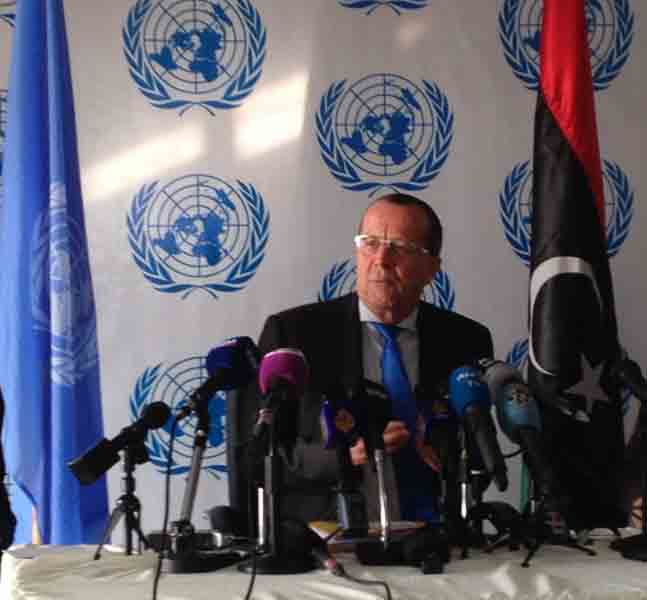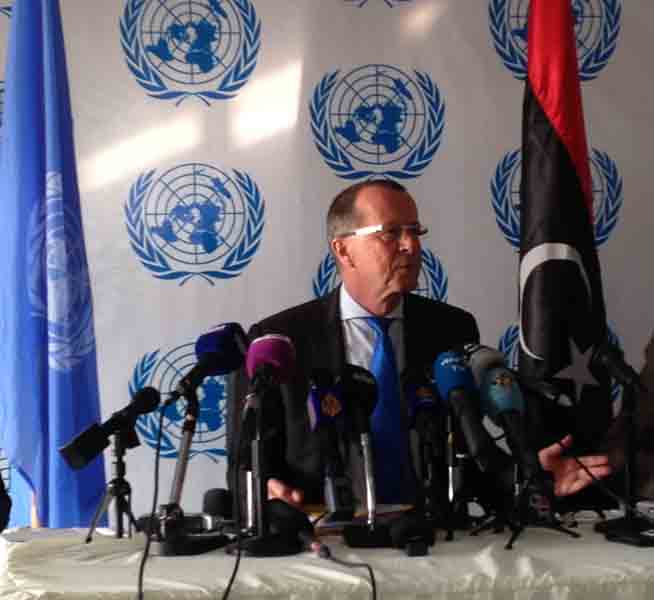By Michel Cousins.

Tunis, 27 January 2016:
The UN is not yet looking at sanctions against Libyan figures viewed as trying to sabotage . . .[restrict]the Libyan Political Agreement, UN Envoy Martin Kobler has said. The aim at present, he explained at a press conference this morning in Tunis, is to broaden its support basis so that as many opponents as possible back it. To achieve this, he said he would continue to talk to those who currently did not. The entire international community backed the LPA, he added. Not a single state opposed it. The only people doing so were some forces in Libya.
Kobler also insisted that the HoR could not at this point make any changes to the Libyan Political Agreement signed in Skhirat and approved by the UN Security Council last month.
Amendments to the LPA could only be made by the HoR acting “in consensus” with the planned State Council, he said. But “the State Council does not yet exist,” he stated. Although not saying so in as many words, he indicated that the only way that the deal could be changed was for the HoR to first vote for it it in its entirety.
He called on the HoR to do so, but pointing out that nothing could happen until the Presidency Council submitted a new government list to the parliament within the ten-day deadline. That deadline had to be kept to, he said. However, what that list would contain was, “not my business”, he added. It was up to Libyans to decide the names and how big or small was the government.
On the matter of reports of sanctions which he said were not on the UN’s agenda, Kobler nonetheless sharply criticised the Tripoli regime for denying him landing rights at a number of western Libyan airports. He understood that some UN members states were impatient with a number of Libyan figures, he said. “But I am also sometimes impatient”, he said, waving a letter containing a list of the places in western Libya where the UN has been denied permission to land.
This was “not acceptable” he said.
On reports of UN peacekeepers being planned for Libya, Kobler refuted the suggestion. ”Blue helmets are not on the agenda”, he said.
Security had to be provided by the Libyans themselves. They had to fight the forces of the so-called Islamic State while also ensuring that Tripoli was safe for the government to relocate there. He nonetheless indicated that talks with militias in Tripoli were working. Both the security team set up by prime minister-designate Faiez Serraj, and his own military adviser General Paolo Serra were in contact with a number of them, he said. But, suggesting that one of the aims is to switch off funding for the militias, he said that Libya was the only country in the world where militias were paid for by the Central Bank. Funding, he suggested, needed to be used instead to either integrate them into the military or to demobilise them.
Speaking before flying off to Addis Ababa for a meeting of the African Union’s Libya Contact Group, Kobler also said that the AU had an important role to play in helping solve the Libya crisis. “Libya is an Arab country but it is also an African country,” he added, noting that terrorist cells in the south of were spreading danger to Niger and Chad. The AU had to play a bigger role in Libya, he said. [/restrict]









